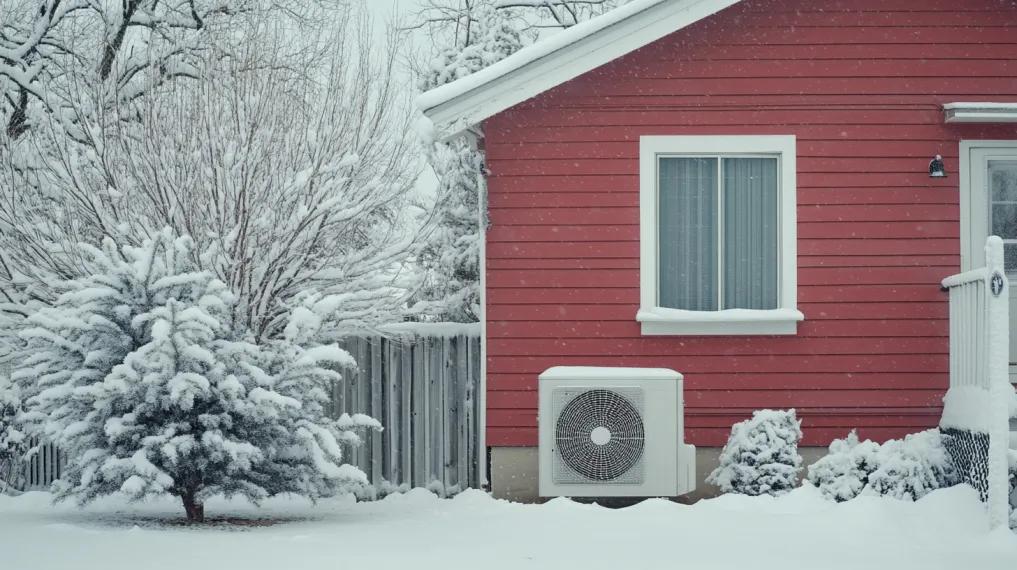Why Is My Heat Pump Blowing Cold Air in the Winter?

Heat pumps are unique in that they can both cool your home during the summer and warm it during the winter. However, if your heat pump is blowing cold air when it’s supposed to be heating, there is clearly an issue. HVAC.com explains some of the most common reasons why your heat pump might be blowing cold air in the winter and provides solutions to fix the problem.
Common Causes of a Heat Pump Blowing Cold Air in Winter
If your heat pump is blowing cold air while in heating mode, here are some possible reasons:
1. Incorrect Thermostat Settings
One of the simplest issues to check is whether your thermostat is set correctly.
Solution: Make sure it’s switched to HEAT mode and not COOL. Also, check the fan setting. If the fan is set to ON instead of AUTO, your heat pump will blow air continuously, even when it’s not actively heating. This can make it feel as though the system is blowing cold air between heating cycles.
2. Refrigerant Leak
Refrigerant is essential to the operation of your heat pump. In cooling mode, refrigerant extracts heat from inside your home and expels it outside. In heating mode, it works in reverse by removing heat from the outdoor air and releasing it indoors. If there’s a leak, the system won’t have enough refrigerant to operate properly, which could lead to cold air being blown into your home instead of warm air.
Solution: If you suspect a refrigerant leak, contact an HVAC technician to inspect your system, repair the leak, and recharge the refrigerant.
3. Faulty Reversing Valve
A heat pump’s reversing valve is responsible for switching the system between heating and cooling modes. A malfunctioning reversing valve can prevent the system from switching properly, causing it to blow cold air even when it should be heating. This issue can be caused by electrical problems, wear and tear, or low refrigerant levels.
Solution: If the reversing valve is stuck or faulty, it will need to be repaired or replaced by an HVAC technician.
4. Clogged or Dirty Air Filter
A clogged air filter is another common culprit for a heat pump blowing cold air in the winter. Over time, filters can accumulate dust, dirt, and debris, which restricts airflow into the system. When airflow is limited, it can cause the evaporator coil to freeze up, which in turn reduces the system’s ability to heat your home effectively. The result? Cold air is circulated indoors.
Solution: Regularly change or clean your heat pump’s air filter to ensure proper airflow. This simple maintenance step can improve system performance and prevent further issues.
5. Dirty Condenser Coil
A dirty or clogged condenser coil can also prevent your heat pump from working efficiently. The condenser coil plays a crucial role in transferring heat, and when it’s covered in dirt, leaves, or debris, the system can’t absorb heat properly from the outdoor air. This can cause the system to blow cold air inside.
Solution: While cleaning the condenser coil is something that homeowners can do themselves, it’s often better to hire a professional to ensure it’s done safely and thoroughly, especially if the coil is heavily soiled.
6. Frozen Heat Pump
A frozen heat pump can be a serious issue. When ice builds up on the outdoor unit, it prevents the system from extracting heat from the air effectively. Several factors can cause freezing, including low refrigerant levels, a clogged air filter, or a malfunctioning defrost cycle.
Solution: If your heat pump is frozen, you can try thawing it by spraying the outdoor unit with water and setting the system to fan mode to melt the ice. If the issue persists, it’s best to call a technician.
7. Outdoor Temperature Limits
Although newer heat pumps are designed to work in colder temperatures, many systems begin to lose efficiency once the temperature drops below freezing. In very cold weather, your heat pump may struggle to extract enough heat from the outside air, causing it to blow cold air inside.
Solution: If you live in an area with extremely cold winters, consider upgrading to a heat pump designed for low temperatures. In some cases, a supplemental heating system, like a furnace or electric heater, may be needed.
Preventing Cold Air Problems with Regular Maintenance
The best way to avoid issues with your heat pump, including it blowing cold air in the winter, is through regular maintenance. Heat pumps that are used year-round should be serviced twice a year – once before the cooling season and again before the heating season. Regular maintenance ensures that your system is running at its peak efficiency, reducing the likelihood of problems.
During a heat pump maintenance visit, an HVAC technician will perform a variety of tasks, such as:
- Inspecting for refrigerant leaks
- Checking and tightening electrical connections
- Lubricating moving parts
- Cleaning coils
- Replacing air filters
- Testing system performance to ensure proper operation
By scheduling regular maintenance, you can identify and address minor issues before they turn into major problems. This can extend the lifespan of your heat pump and keep it working efficiently, saving you money on energy bills and costly repairs in the long run.